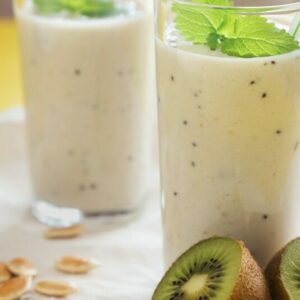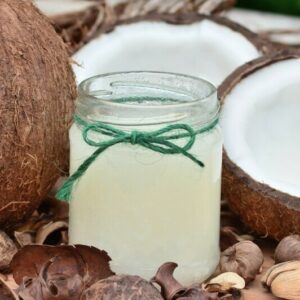If you’ve ever savored the tangy zip of kefir or the subtle crunch of sauerkraut, you’ve experienced more than just a flavor kick. Read on to find out why you should eat fermented food for gut health. These foods are champions of your inner world, specifically your gut health, though you might not realize it yet.

In my journey, I discovered that starting with kefir, fermented food isn’t just a culinary preference—it’s a powerhouse for your microbiome. I’ll share insights on why nurturing your gut with these foods is a non-negotiable pillar for good health.
Your gut is not just an organ that digests food; it’s a complex ecosystem inhabited by trillions of microorganisms that play a major role in your overall health. These tiny inhabitants are in constant conversation with your body, aiding digestion, bolstering your immune system, and even impacting your mood.
So, when we talk about fermented foods, we’re actually discussing the care and feeding of this incredibly intricate microbial community. My own experience has convinced me that kefir and its fermented kin are much more than a tasty trend—they’re crucial for maintaining a balanced gut.
Understanding the Microbiome and Benefits of Fermentation
You may have heard that your gut is teeming with bacteria, and that’s not only normal, but essential for your health. This inner world of microscopic allies is known as the microbiome. It consists of a diverse array of microorganisms that play a vital role in your digestion, immune function, and even your mood.
Now, fermentation is a natural process where bacteria, yeast, or other microorganisms break down sugars and starches. This not only preserves the foods but also creates beneficial enzymes, vitamins, and probiotics – the good bacteria that our microbiome thrives on.
But why are these probiotics so important? Well, they help balance the gut flora, potentially warding off pathogens, aiding digestion, and even improving nutrient absorption. Plus, a robust microbiome is linked with a reduced risk of chronic diseases, like obesity and type 2 diabetes, and it could also bolster your mental health.

Fermented foods are a natural powerhouse. They’re often rich in lactobacilli, a type of bacteria that can benefit your health. Regularly including foods like kefir in your diet can help maintain that balance of good bacteria, ensuring your gut is a well-oiled machine.
So, kefir isn’t just a tangy beverage; it’s a cocktail of microbial support for your gut.
This is why you should eat it every day! It’s fascinating how these ancient practices of preserving foods can result in such modern health benefits. And for me, this isn’t just theory.
Consuming kefir by the liter helped me gain the weight I needed and more importantly, boosted my immune system – a testament to the power of these microscopic wonders.
Personal Journey: The Weight-Gain and Immunity Boost From Kefir
I remember vividly when I started including kefir in my daily diet. It wasn’t just another food trend; it became a crucial turning point in my health journey. Struggling to maintain a healthy weight, I researched and tried various recommendations until I hit upon the gem that is kefir.
Drinking kefir, not just occasionally but by the liter, had a remarkable effect. Over time, I noticed a significant and much-needed increase in weight. It was as if my body had been eagerly waiting for this missing puzzle piece. My immune system seemed to perk up too, fending off seasonal colds and allergies with more vigor than before.
What took me by surprise was an unexpected benefit: my skin health improved. People started to compliment me on my newfound glow, and I was seeing fewer breakouts. The probiotics in kefir were working their magic not just internally but were evidently blessing me externally as well.
It’s hard to overstate how much of a positive change kefir made in my life. But then, some years later, after effortlessly weaving this superfood into my routine, my doctor advised me to cut down on dairy. That advice stemmed from a lactose intolerance diagnosis that forced me to step back and reassess my options. There was a clear disappointment as I enjoyed my occasional kefir indulgence.
Navigating Lactose Intolerance and Fermented Foods
A few years into my fermented food journey, I ran into an unexpected hurdle. Despite the wonderful benefits I had been reaping from kefir, my doctor informed me that my persistent digestive issues might be due to lactose intolerance. I was advised to steer clear of all milk products – yes, including my beloved kefir.
That advice hit me hard. After all, kefir had become a daily staple for me, something I actually looked forward to. And here’s something you might not know: even though fermentation reduces the lactose in milk, making it easier to tolerate for some people with sensitivities, it doesn’t eliminate it completely. For someone with lactose intolerance, this could still pose a problem.
I started questioning everything. Could the symptoms I was experiencing actually come from the very food that I thought was doing me good? It was a sobering thought. So, with a heavy heart, I began avoiding kefir, ready to search for dairy-free alternatives that wouldn’t compromise my gut health.
This marked the beginning of a new chapter in my gut health journey. I set out to find fermented options that were lactose-free yet still packed with probiotics. This exploration led me to the world of plant-based ferments, and specifically, to the doorstep of coconut kefir.
If you’re like me, dealing with lactose intolerance but still keen on nurturing your gut health with fermented foods, stay tuned. In the next section, I’ll walk you through the ins and outs of making your own coconut kefir, a delicious and belly-friendly alternative to the dairy-based original.
Coconut Kefir: A Dairy-Free Alternative

When I found out I was lactose intolerant, I needed a solution that would allow me to continue enjoying the benefits of fermented foods without the discomfort. That’s when I discovered coconut kefir. Unlike traditional milk kefir, coconut kefir is dairy-free and offers a tangy alternative that plays nicely with my gut without triggering intolerance issues.
I realized that even without dairy, I can nurture my gut health and maintain the benefits I’d come to appreciate.
For those interested in making coconut kefir for your gut health, the process is quite straightforward.
Step 1. Begin with coconut milk – which you can either source from a store or make at home by blending coconut meat with water.
Step 2. You’ll then add kefir grains, which are not actual grains but a symbiotic culture of bacteria and yeast (SCOBY), to the coconut milk and
Step 3. Allow the mixture to ferment at room temperature typically for around 24 hours. The fermentation period can be adjusted depending on the desired level of tartness and thickness.
Step 4. Once your coconut kefir is ready, you can refrigerate it, slowing down the fermentation process.
It’s versatile in use, too; enjoy it plain, add it to smoothies, or use it as a base for dressings. Full of probiotics, coconut kefir not only supports your digestive system but can also add a boost to your immune system.
Now, transitioning to the next section, it’s worth mentioning that while I have a soft spot for coconut kefir, it’s just one character in the cast of fermented foods that populate culinary traditions around the world. Each culture has its unique spin on fermentation, offering a myriad of tastes and benefits.
Exploring Global Fermented Foods: A Cultural Digest
The world offers a wealth of fermented marvels, each with roots deeply embedded in cultural traditions. Variety is just as important for your gut as it is for your palate, and exploring international fermented foods can introduce a bounty of beneficial bacteria.
From the spicy kimchi of Korea to the tangy kombucha of Russia, fermented foods span the globe. These are not just culinary delights but functional foods that have sustained and enriched communities through history. Let’s take a closer look at some of the most popular fermented foods from around the world.
Sauerkraut from Germany stands out for its simplicity and its powerhouse of probiotics. Miso, a staple in Japanese cuisine, offers a complex flavor profile and digestive benefits.
Then there’s tempeh from Indonesia, a fermented soy product known for its high protein content and positive effects on gut flora. Each of these foods demonstrates the universal acknowledgment of fermentation’s role in health.
These international delights share a common thread: they are all crafted by allowing natural bacteria to transform basic ingredients into nutrient-rich superfoods. This process not only preserves these foods but also amplifies their health benefits.
Whether it’s a creamy yogurt from the steppes of Mongolia or the effervescent kvass from Eastern Europe, fermented foods tell a tale of human ingenuity and the pursuit of wellness. By inviting these foods into your diet, you open the door to a world of flavor and a garden of microbial diversity.
Now, as we prepare to conclude, remember that adding fermented foods to your diet is about more than just taste—it’s about nourishing your body and supporting a thriving microbiome. In the next section, I’ll wrap up with some key takeaways and encourage you to make fermented foods a regular guest at your dining table.
Conclusion: Embracing Fermented Foods for a Healthier Lifestyle
After exploring the vast landscape of fermented foods, it’s clear that these nutritional powerhouses carry immense benefits for our gut health and, by extension, our overall wellbeing.
Whether it started with a glass of kefir or a spoonful of kimchi, the journey through the world of fermented delicacies is a testament to the adage that good health truly begins in the gut. My own experience with kefir, despite the hiccup of lactose intolerance, opened up a new avenue to coconut kefir, offering not only sustenance but also a delightful addition to my diet.
While I’ve highlighted some personal anecdotes and practical advice, remember that each body is unique. It’s essential to consult with healthcare professionals especially when making significant changes to your diet or navigating food sensitivities.
And for those who are just beginning to dabble in the art of fermentation, take it slow. Start by integrating small portions into your meals and pay attention to how your body responds. You might be surprised by the positive changes you witness in your digestion, skin vibrancy, and immune response.
Fermentation is an ancient tradition that has stood the test of time for good reason. I encourage you to let curiosity lead you through the supermarket aisles or farmers’ markets and pick up something fermented you’ve never tried before.
Here’s to fostering a flourishing microbiome and cementing fermented foods as a staple in our diets for a richer, more vibrant state of health.